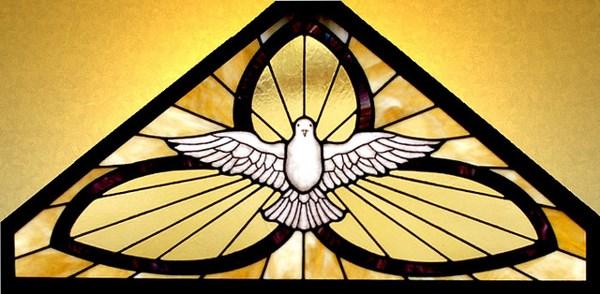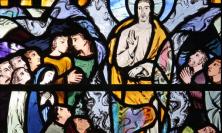‘The Holy Spirit, as God’s seal, both unites us to God as his, and is the pledge guaranteeing our redemption.’ For Pentecost, Fr Harry Elias helps us to build a picture of the union with God into which the Holy Spirit draws us and of how we are called to strengthen that union.
A seal is generally taken as a mark of identity and belonging, though it can also refer to the device by which this mark is made. In the Song of Songs (8:6), the beloved asks her lover to set her ‘as a seal upon your heart, as a seal upon your arm; for love is strong as death, passion fierce as the grave.’ The image of a seal suggests her as being worn as a bracelet or a pendant on a chain round the neck; or even that her own self is seared into the arm or onto the chest like a tattoo, so that her identity is bound up and inseparable from her lover’s. A seal stamps the identity of the owner on what is sealed, and could also imply the ‘sealing up’ of that union as inviolable.
It was God’s own initiative that by hearing the gospel we believed in Christ and were sealed as God’s own people by the Holy Spirit. Paul says that the seal of the Holy Spirit is the pledge of our inheritance:
In Christ we have also obtained an inheritance, having been destined according to the purpose of him who accomplishes all things according to his counsel and will, so that we, who were the first to set our hope on Christ, might live for the praise of his glory. In him you also, when you had heard the word of truth, the gospel of your salvation, and had believed in him, were marked with the seal of the promised Holy Spirit; this is the pledge of our inheritance towards redemption as God’s own people, to the praise of his glory. (Ephesians 1: 11-14)
In the common usage of that time, a pledge was a down payment, a deposit, a guarantee. The Holy Spirit, as God’s seal, both unites us to God as his, and is the pledge guaranteeing the redemption of our bodies. Elsewhere, Paul sees the seal as the first fruits of redemption (Romans 8:22-23).
‘For it is on him [as Son of Man] that God the Father has set his seal’ (John 6:27): the seal of the Spirit was given first to Christ, announced by the angel Gabriel to Mary. It was then given to him and to John the Baptist at Christ’s baptism, when the Spirit appeared as a dove and there was a voice coming from heaven – ‘You are my Son, the Beloved; with you I am well pleased’ (Mark 1:10-11); and to the disciples at the transfiguration, with the cloud denoting the Spirit’s presence, accompanied by the voice. The same seal of the Spirit is given at Christ’s death: in Matthew and Mark this is depicted in the tearing of the Temple veil which separated the holy of holies, where the presence of God was believed to reside, just as at the baptism of Jesus the heavens were torn apart for the Spirit to rest on Jesus; and in the voice of the centurion – ‘Truly this man was God’s Son’ (Mark 15:38-39; Matthew 27:51,54). In Acts, on the day of Pentecost, the Spirit came with the sound of a wind and in tongues of fire, and the people prophesied in their own tongues (Acts 2:2-5). In John (20:22-23), Jesus appeared to the disciples in the locked upper room, breathed on them and told them to receive the Holy Spirit for the forgiving of sins, for which he shed his blood.
In 2 Corinthians 3, Paul contrasts the law engraved on stone with the Spirit of God’s glory, as if that Spirit is engraved in Christ, so that he could even say the Lord is the Spirit just as one could say that the stone tablets on which the law is engraved are the law. This Spirit of God’s glory is now the Spirit of Christ the Lord, and is transforming us from glory to glory into the image of Christ (2 Corinthians 3:17-18), who himself is ‘the image of the invisible God, the firstborn of all creation through and for whom all things were created and are held together.’ (Colossians 1: 15-16). With the image of the risen Christ becoming clearer and clearer, the pledge of our redemption is being fulfilled even now.
To be conformed to the image of Christ, we should ‘not be conformed to this world, but be transformed by the renewing of your minds, so that you may discern what is the will of God – what is good and acceptable and perfect’ (Romans 12:2). We must make every effort ‘to maintain the unity of the Spirit in the bond of peace. There is one body and one Spirit, just as you were called to the one hope of your calling.’ (Ephesians 4:3,4) The gifts we receive from the Spirit are ‘for the building up of the body of Christ until all of us come to the unity of faith and of the knowledge of the Son of God, to maturity, to the measure of the full stature of Christ’. (Ephesians 4:12,13). ‘Speaking the truth in love, we must grow up in every way into him who is the head, into Christ’, otherwise, we grieve the Holy Spirit of God (Ephesians 4:15,30). John in his gospel calls the Spirit, the Spirit of truth (John 14:17) in opposition to the unholy Spirit, the devil, the deceiver and liar.
Being made in the image of Christ does not take away our identity. God’s beauty is infinitely varied. Paul, in the well-known chapter where he talks of the Church as the body of Christ, says: ‘But as it is, God has arranged the members in the body, each one of them, as he chose,’ and each with their own particular gifts. ‘To each is given the manifestation of the Spirit for the common good.’ (1 Corinthian 12:18,7) In Revelation 2:17, we are told that to everyone who conquers, ‘I will give a white stone, and on the white stone is written a new name that no one knows except the one who receives it’. It is a unique name and even we do not yet know who we are fully. ‘For now we see in a mirror, dimly, but then we will see face to face. Now I know only in part; then I will know fully, even as I have been fully known.’ (1 Corinthians 13:12) In the body of Christ there are no clones, and no one need compete for the same place as each one is loved uniquely and is given a unique mission.
The breath of God imparting life, the power of God working miracles and speaking through the prophets, the wisdom of God, the breath of Jesus to bring forgiveness and a restored creation – all are revealed as Person, with the same life of God as Father and Son. The transmitting of God’s life by Father and Son to the Holy Spirit both consummates their union and establishes the Personhood of the Holy Spirit as its Seal. The eternal life of the one God is the life of Father, Son and Holy Spirit. As the Seal of union of Father and Son, the Holy Spirit seals us into that intimate and fruitful mutual union of God’s life, where each one is special and beloved.
When our hopes collapse, the Holy Spirit is always with us as another Advocate or Comforter (John 14:16). It was when the disciples’ hope of God’s kingdom coming in the lifetime of Jesus was crushed, that the Spirit was poured out. This Spirit of God, also the Spirit of Christ, becomes our Spirit, sealing our union with Christ, and pledging its continuance in an unfailing hope of redemption of our bodies. Living a life directed by the Spirit (see Romans 8:5-17), and ourselves as a temple of the Holy Spirit (1 Corinthians 6:19), we are handed over as an offering, an advocate in the service of another Advocate. By our own hope, our encouragement, endurance and intercession, we strengthen God’s union with others and ourselves, and his pledge of peace for his whole creation in Christ, to the praise of his glory.
Harry Elias SJ assists in the Hurtado Jesuit Centre in Wapping, East London.






